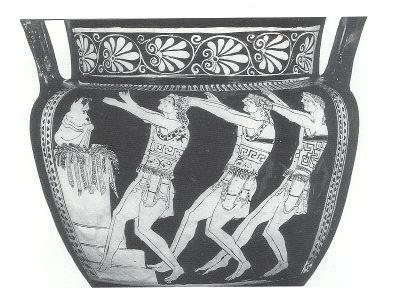|
|
|


Lecture 13: A Brief Introduction
to Greek Tragedy
Focus
Passages
More
Resources
A) Sophocles' Ajax
Tecmessa: Mates of the ship of Ajax, offspring of the race that springs from the Erechtheids, the soil's sons, cries of grief are the portion of us who care from afar for the house of Telamon. Ajax, our terrible, mighty lord of untamed power, now lies plagued by a turbid storm of disease.Chorus: And what is the heavy change from the fortune of yesterday which this night has produced? Daughter of Teleutas the Phrygian, speak, since for you his spear-won mate bold Ajax maintains his love, so that with some knowledge you could suggest an explanation.
Tecmessa: Oh, how am I to tell a tale too terrible for words? Grave as death is the suffering [pathos] which you will hear. By madness our glorious Ajax was seized in the night, and he has been subjected to utter disgrace. All this you may see inside his dwelling--butchered victims bathed in blood, sacrifices of no hand but his.
Chorus: What report of the fiery warrior have you revealed to us, unbearable, nor yet escapable-- a report which the great Danaans propound, which their powerful storytelling spreads! Ah, me, I shudder at the future's advancing step. In public view the man will die because the dark sword in his frenzied hand massacred the herds and the horse-guiding herdsmen.
Tecmessa: Ah! Then it was from there, from there that he came to me with his captive flock! Of part, he cut the throats on the floor inside; some, striking their sides, he tore asunder. Then he caught up two white-footed rams and sheared off the head of one and its tongue-tip, and flung them away; the other he bound upright to a pillar, and seizing a heavy strap from a horse's harness he flogged it with a whistling, doubled lash, while he cursed it with awful [kakos] imprecations which a god, and no mortal, had taught him.
Chorus: The time has come for each of us to veil his head and steal away on foot, or to sit and take on the swift yoke of rowing, giving her way to the sea-faring ship. So angry are the threats which the brother-kings, the sons of Atreus, speed against us! I fear to share in bitter death beneath an onslaught of stones, crushed at this man's side, whom an untouchable fate holds in its grasp.
B) Sophocles' Ajax
I shiver with rapture; I soar on the wings of sudden joy! O Pan, O Pan, appear to us, sea-rover, from the stony ridge of snow-beaten Cyllene. King, dancemaker for the gods, come, so that joining with us you may set on the Nysian and the Knosian steps, your self-taught dances. Now I want to dance. And may Apollo, lord of Delos, step over the Icarian sea and join me in his divine form, in eternal benevolence!Ares has dispelled the cloud of fierce trouble from our eyes. Joy, joy! Now, Zeus, now can the white radiance of prosperous days approach our swift, sea-speeding ships, since Ajax forgets his pain anew, and has instead fully performed all prescribed sacrifices to the gods with worship and strict observance.
The strong years make all things fade. And so I would not say that anything was beyond belief, when beyond our hopes, Ajax has been converted from his fury and mighty struggles against the Atreidae.
Some of my notes for this lecture were based on Roger Dunkle's Introduction to Greek Tragedy. This site contains a wealth of information about Greek drama accompanied by images and maps.For more background on the origins of drama see Professor Dora Pozzi's Greek Drama and its Precursors. You might also find helpful her Terms Related to Greek Myth and Theater. For more on Dionysus and the Great Dionysia see Rituals of Dionysus: Great Dionysia.
For a better understanding of the performance space of Athenian drama see Recreating the Theater of Dionysus in Athens, published by UC Berkely's Didaskalia.
The Perseus Project Encylopedia entry for Sophocles is here.
Cambidge Classics offers a basic introduction to tragedy including discussion of tragedy's origins, social context, language, and performance. There is also a list of known tragedies and their dates with links to texts. An article discussing theatrical and philosophical responses to Greek tragedy is here.
Have you ever wondered how translation can affect our interpretation of these ancient texts? Read Mary Ebbott's review of a new translation of 4 tragedies of Euripides.

A Tragic Chorus
Spectators watch the funeral games of Patroklos on a cauldron painted by Sophilos.